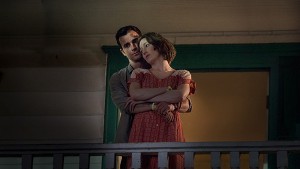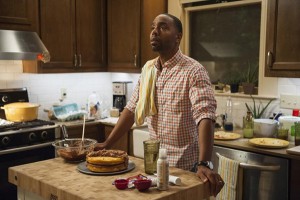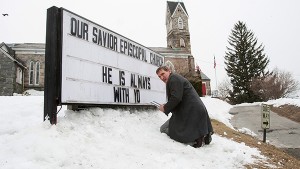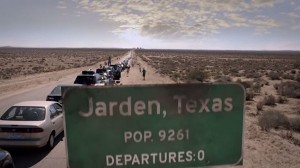 “Everybody’s wonderin’ what and where they all came from. Everybody’s worryin’ ‘bout where they’re gonna go when the whole thing’s done, but no one knows for certain so it’s all the same to me. I think I’ll just let the mystery be”
“Everybody’s wonderin’ what and where they all came from. Everybody’s worryin’ ‘bout where they’re gonna go when the whole thing’s done, but no one knows for certain so it’s all the same to me. I think I’ll just let the mystery be”
From the opening credits of its second season, The Leftovers lets its viewers know, in no subtle way, about the philosophical themes that will be dealt with by its characters. The show is set in a fictional world in which 140 million people (2% of earth’s population) disappeared without explanation on October 14th, 2011. This event is known as The Sudden Departure. While that is a very high-concept sci-fi premise, the series is profoundly moving, because it is about real people dealing with real issues. (To quote Ben Wyatt, “They’re telling human stories in a fantasy world!”) You and I may not have to worry about some inexplicable vanishing of millions of people, but everyone experiences the deaths of loved ones, and we all live with a consciousness of our own mortality. Through the lens of the Departure, The Leftovers beautifully captures the grief, pain, and confusion that comes with the reality of death.
Every character in the show is looking for hope, or at least some answers to their questions, in a world that is seemingly governed by chaos. Most people just try to move on with their lives and not think too much about the Departure or its possible implications. Basically, they are ignoring their problems. While that may seem like the easiest and most comforting way to live in the midst of turmoil and loss, it is not a particularly healthy lifestyle. Suppressing one’s feelings and attempting to forget all negative memories will usually lead to depression or insanity, and that is seen in the lives of multiple characters. Knowing this, there are many people who take the opposite approach; namely, living every day in purposeful remembrance of the Departure. People who feel this way began a cult called the Guilty Remnant, whose mission is to “stand before you as living reminders of God’s awesome power, for His judgment is upon us.” Now, this is not a Christian organization, but rather a group of people who feels responsible in some way for the Departure. They feel that it was some sort of rapture-like event carried out by God to pass judgment on an evil world. Members of the Guilty Remnant live their lives in complete silence as a way to atone for their past sins. This cult is an attractive offer to people who feel lost, confused, and alone after losing loved ones. It gives them an immediate sense of belonging and purpose, which can help tremendously in the coping process.
 Another popular remedy for feelings of sadness and insecurity is the town of Jarden, Texas. This town experienced zero departures on October 14th, and for this reason is viewed as a sort of safe haven for weary people to find peace and comfort. Just about everyone in the world wants to get into Jarden, but very few can; gates and armed officers block it off. The only parts of the town that are open to the public are Miracle National Park – which celebrates the fact that the town was spared on the day of the Departure – and a campsite just outside of the city gates. Thousands of people camp out day and night, desperately hoping to get into the town so they will finally feel perfectly safe from the outside world. While the Guilty Remnant attracts people who feel guilty and want to redeem themselves, the town of Jarden attracts people who want to move on with their lives, but can’t due to fear. Most people believe that if they can just get into Jarden, all of their problems will be solved and they can live happily ever after. Nora Durst, one of the series’ key protagonists, feels this way and successfully moves to the town. Nora lost her husband and children in the Departure, and she would do anything to feel safe and happy again. After placing all of her hope in this town, she quickly realizes that things are not perfect there. (No spoilers, but the central mystery of the season involves a disappearance in Jarden, which happens the night that Nora arrives.) So clearly, the primary means of peace and safety that the world has to offer, whether through a cult or a “Miracle” town, are ultimately imperfect, offering no lasting hope or purpose. Once this is understood, you have two options: 1.) Trust that God has a perfect plan, even if you don’t understand it, or 2.) Accept that life is absurd and meaningless, and live your life accordingly.
Another popular remedy for feelings of sadness and insecurity is the town of Jarden, Texas. This town experienced zero departures on October 14th, and for this reason is viewed as a sort of safe haven for weary people to find peace and comfort. Just about everyone in the world wants to get into Jarden, but very few can; gates and armed officers block it off. The only parts of the town that are open to the public are Miracle National Park – which celebrates the fact that the town was spared on the day of the Departure – and a campsite just outside of the city gates. Thousands of people camp out day and night, desperately hoping to get into the town so they will finally feel perfectly safe from the outside world. While the Guilty Remnant attracts people who feel guilty and want to redeem themselves, the town of Jarden attracts people who want to move on with their lives, but can’t due to fear. Most people believe that if they can just get into Jarden, all of their problems will be solved and they can live happily ever after. Nora Durst, one of the series’ key protagonists, feels this way and successfully moves to the town. Nora lost her husband and children in the Departure, and she would do anything to feel safe and happy again. After placing all of her hope in this town, she quickly realizes that things are not perfect there. (No spoilers, but the central mystery of the season involves a disappearance in Jarden, which happens the night that Nora arrives.) So clearly, the primary means of peace and safety that the world has to offer, whether through a cult or a “Miracle” town, are ultimately imperfect, offering no lasting hope or purpose. Once this is understood, you have two options: 1.) Trust that God has a perfect plan, even if you don’t understand it, or 2.) Accept that life is absurd and meaningless, and live your life accordingly.
 One character that takes the latter approach is John Murphy, a longtime Jarden resident who firmly believes that “there are no miracles in Miracle.” John has a very naturalistic worldview, which allows him to see things from a realistic perspective, even when everyone around him believes in the supernatural. From his point of view, the Departure was a totally random, purely scientific event that has nothing to do with morality or religion. In his mind, there is absolutely no reason that those hundreds of millions of people vanished, which also means that there is no reason that the rest of the world is still living. John addresses the confusion that resulted from the Departure with realism and nihilism. He lives his life in anger, tearing down anyone who believes in the divine. There is no comfort, purpose, or lasting hope with this worldview, but it makes sense. If there is no God, or at least some sort of divine presence that governs the world in a somewhat controlled manner, then life would be ultimately meaningless, because everything happens for no reason and then you die. And some people would honestly rather believe that than put their faith in God.
One character that takes the latter approach is John Murphy, a longtime Jarden resident who firmly believes that “there are no miracles in Miracle.” John has a very naturalistic worldview, which allows him to see things from a realistic perspective, even when everyone around him believes in the supernatural. From his point of view, the Departure was a totally random, purely scientific event that has nothing to do with morality or religion. In his mind, there is absolutely no reason that those hundreds of millions of people vanished, which also means that there is no reason that the rest of the world is still living. John addresses the confusion that resulted from the Departure with realism and nihilism. He lives his life in anger, tearing down anyone who believes in the divine. There is no comfort, purpose, or lasting hope with this worldview, but it makes sense. If there is no God, or at least some sort of divine presence that governs the world in a somewhat controlled manner, then life would be ultimately meaningless, because everything happens for no reason and then you die. And some people would honestly rather believe that than put their faith in God.
 One character that does trust in God with all his heart is Matt Jamison, Nora’s brother and a devoted Episcopal reverend. Matt is one of the most fascinating and sympathetic characters on the show because he continually trusts in God through some of the most difficult circumstances imaginable. He did not lose anyone at the Departure, but his wife Mary was completely paralyzed in a car crash on that day. This would be cause enough for most people to leave the faith, but Matt viewed it as an opportunity to trust God even more. He has the opportunity to serve at a church in Jarden, and on his first night there, his wife comes back to consciousness, only to immediately revert back to her coma the next morning. Because of this, Matt wholeheartedly believes that God used this town to perform a miracle in Mary’s life, and he spends every following day taking care of her and praying to God that her health would be restored. He continues to trust in God, despite the insistence of his friends and family to just let it go. Matt mentions that his favorite book of the Bible is Job, which is fitting, considering his unshakeable faith in God in the midst of life-altering pain. Over the course of the season, Matt endures hardship after hardship due to his attempts to follow God’s will for his life, and he never loses faith. Those around him think he is delusional, but there is a noticeable difference in the way he lives his life when compared to the rest of the town: he has joy. This joy can only come from something outside of temporal circumstances; it is a joy that comes from eternal hope, a peace that “surpasses all understanding” (Phil. 4:7). This is what sets Matt apart from everyone else around him. Most people, if they believe in anything at all, will put their faith in a town or a cult, while Matt rests in his understanding of the love and sovereignty of God.
One character that does trust in God with all his heart is Matt Jamison, Nora’s brother and a devoted Episcopal reverend. Matt is one of the most fascinating and sympathetic characters on the show because he continually trusts in God through some of the most difficult circumstances imaginable. He did not lose anyone at the Departure, but his wife Mary was completely paralyzed in a car crash on that day. This would be cause enough for most people to leave the faith, but Matt viewed it as an opportunity to trust God even more. He has the opportunity to serve at a church in Jarden, and on his first night there, his wife comes back to consciousness, only to immediately revert back to her coma the next morning. Because of this, Matt wholeheartedly believes that God used this town to perform a miracle in Mary’s life, and he spends every following day taking care of her and praying to God that her health would be restored. He continues to trust in God, despite the insistence of his friends and family to just let it go. Matt mentions that his favorite book of the Bible is Job, which is fitting, considering his unshakeable faith in God in the midst of life-altering pain. Over the course of the season, Matt endures hardship after hardship due to his attempts to follow God’s will for his life, and he never loses faith. Those around him think he is delusional, but there is a noticeable difference in the way he lives his life when compared to the rest of the town: he has joy. This joy can only come from something outside of temporal circumstances; it is a joy that comes from eternal hope, a peace that “surpasses all understanding” (Phil. 4:7). This is what sets Matt apart from everyone else around him. Most people, if they believe in anything at all, will put their faith in a town or a cult, while Matt rests in his understanding of the love and sovereignty of God.
 In reality, we face the same decisions that the characters of The Leftovers have to make. Like John, we can look at all of the horrible and chaotic things happening in the world around us and conclude that God does not exist, because He surely would not allow such evil to occur. Or, we can trust that He is working to ultimately restore all things back to Himself for our joy and His glory. Like the members of the Guilty Remnant, we can feel responsible for the loss of loved ones or the injustice of the world and punish ourselves accordingly. Or, we can humbly come to God and rest in His all-encompassing grace and mercy. Like Nora, we can contemplate the reality of our own mortality and turn to a worldly means of comfort such as materialism or self-help gurus. Or, we can recognize that we were put on this earth to glorify God, and strive to fulfill that purpose for as long as He would allow. Or, like the show’s theme song suggests, we could “just let the mystery be.”
In reality, we face the same decisions that the characters of The Leftovers have to make. Like John, we can look at all of the horrible and chaotic things happening in the world around us and conclude that God does not exist, because He surely would not allow such evil to occur. Or, we can trust that He is working to ultimately restore all things back to Himself for our joy and His glory. Like the members of the Guilty Remnant, we can feel responsible for the loss of loved ones or the injustice of the world and punish ourselves accordingly. Or, we can humbly come to God and rest in His all-encompassing grace and mercy. Like Nora, we can contemplate the reality of our own mortality and turn to a worldly means of comfort such as materialism or self-help gurus. Or, we can recognize that we were put on this earth to glorify God, and strive to fulfill that purpose for as long as He would allow. Or, like the show’s theme song suggests, we could “just let the mystery be.”
This is just one small feature that makes The Leftovers the best show on television right now. Beyond its weighty philosophical and theological themes, it is thoroughly entertaining, featuring some of the best acting, writing, and directing you will ever see on TV. The series is created by Lost showrunner Damon Lindelof, and while it can be every bit as exciting and infuriating as that show was, the storytelling on display here is much more polished and emotionally affecting. The second season is especially impressive in absolutely every way. If you watch the first few episodes of this show and aren’t sold, don’t give up. The show improves dramatically about six episodes in, and everything that follows is just exquisite television.

I’m binge watching Season 2 and just watched the episode where Matt takes his wife out of town for tests. This has to be one of the most transcendent pieces of television I’ve ever seen, and so I went on search of some reviews to see how others felt. Your writing here is just beautiful and an amazing description of faith. Since 2004 and its events, I’ve been living my life like John, really not understanding how anyone could see things differently. But like I said, your writing here was very enlightening. I suspect you’ll be an excellent theology teacher. 🙂